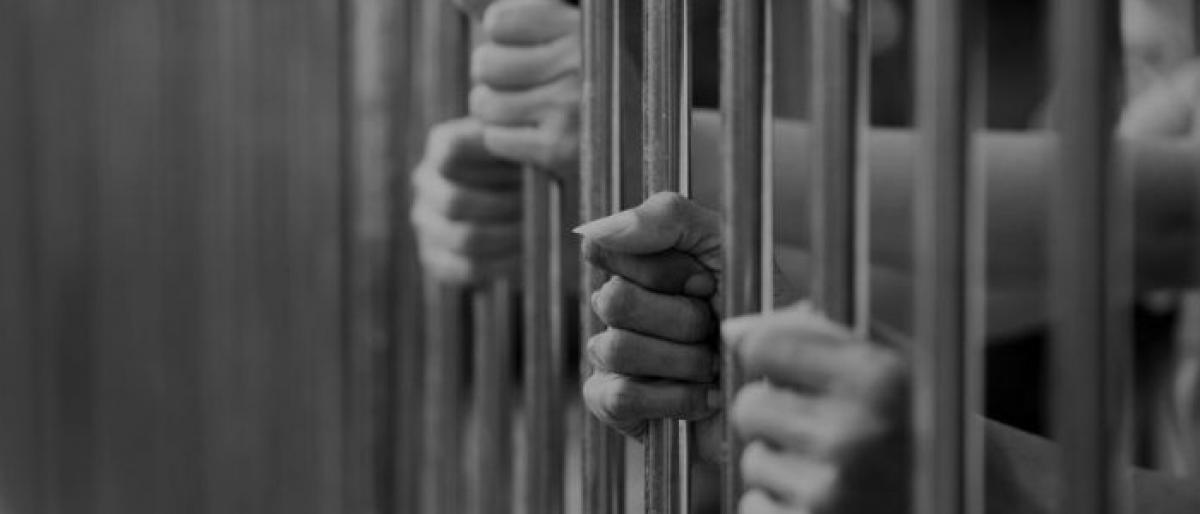Live
- India, Pak in same group; to clash on Feb 23 in Dubai
- Kareena reveals her favourite Shyam Benegal film featuring sister Karisma
- A day with Collector Jeebanananda Mohanty
- Odisha signs pact to operate hydrogen-powered bus
- I am a victim of chit fund scam too: Majhi
- Telangana’s Ganapathi Self-Help Group Emerges Winner at PepsiCo India’s RevolutioNari Awards 2024
- Karnataka State real estate body faces problems over fine collection from builders
- ‘Mother India’ Shefali Shah goes river rafting in Rishikesh
- Hotlines meant for cybercrimes not going through in Bengaluru
- Police appeals to public to stay alert against ‘digital arrest’ scam
Just In

In a recent report, the Ministry of Women and Child Development WCD recommended that women prisoners who have served a third of their terms, should be released on bail But then is this the only issue woman inmate faces in the countrys crowded prisons
In a recent report, the Ministry of Women and Child Development (WCD) recommended that women prisoners who have served a third of their terms, should be released on bail. But then is this the only issue woman inmate faces in the country's crowded prisons?
In fact, what they struggle the most to get is free legal aid, which they are entitled to, leading to delays in securing bail and justice. Not just the women, but at times their children who are born inside the jail also invariably become a victim of such situation.
According to a data shared by free and competent legal service provider National Legal Services Authority (NALSA), the number of women inmates in the country across both the central and district levels is around 19,000. Of these, more than 13,000 are undertrials and only around 6,000 are convicts.
Among the states, Uttar Pradesh has the highest number of women prisoners -- around 4,000, while the number of children growing up in its prisons is more than 350 -- followed by Maharashtra and West Bengal with around 1,500 female inmates in both their states.
"Legal aid is hardly available for women. They are poor and they cannot afford bail for themselves; and when they are in jail, nobody in the family is much bothered. They usually don't get support from their families. It is extremely sad to see that not much are being done for the women inmates," shared advocate and social activist Flavia Agnes.
There are a few factors that leave women behind bars and delay in securing bail.
And the primary reason, according to legal experts, is that the female inmates remain ignorant of access to free legal services.
"Women prisoners are entitled to free legal aid. They will get aid if they ask... but many women don't ask because they suffer from lack of awareness about their rights inside jail. And when the lawyers visit, they skip the sessions," said advocate Meera Bhatia, who has provided free legal aid in the Delhi High Court.
Legal experts also stated that a majority of the women inmates are not well educated and mostly belong to the lower socio-economic strata. Therefore, not just the woman but her families too remain ignorant of the legal services available.
"They can be easily bailed out for a small amount but nobody bothers to do so. Families do not usually prefer to get their ladies back because it will harm their image in society," Agnes pointed out.
"A majority of the women are convicted for cases like theft, domestic violence and human trafficking, and they belong to economically poor families. And the families are not keen on spending money on a woman and helping her secure bail," Agnes added.
Another reason, the legal experts pointed out, is that many lawyers do not show interest in taking up cases where the honorarium is less.
"Lawyers are not very keen on taking up free cases because there is no money. They don't visit the jails as frequently as they should; there is hardly anyone to create awareness about the legal rights to the female inmates. They (lawyers) take up cases where they can draw good money," Agnes explained.
In the states, at the district and local levels, legal aid is provided by SLSA (State Legal Services Authorities), DLSA (District Legal Services Authorities) and TLSA (Taluka Legal Services Authorities), respectively. Add to this the lawyers at the national level, the number comes to more than 61,000, of whom 11,000 are women.
"The perspective is different with the different free legal aid authorities. Whether to give bail or not is a prerogative of the court and not of the legal aid authorities. If a woman fails to get a lawyer on her own she can approach for free legal aid when the representatives visit the jails. The lawyers will then put ahead the bail application," Sunil Chauhan, an advocate associated with the national-level authority pointed out.
However, Chauhan added that once the case goes to court, the matter is considered on the basis of the crime and not the individual.
"The bail is for the court to decide. These hearings are like any other and it is not necessary that bail will be granted," he added.
By: Somrita Ghosh

© 2024 Hyderabad Media House Limited/The Hans India. All rights reserved. Powered by hocalwire.com







